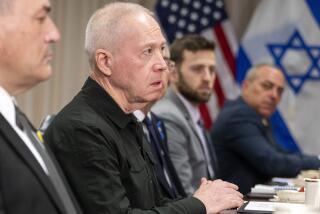U.S. Brass Stands by Strategy
- Share via
WASHINGTON — The U.S. military’s top civilian and uniformed leaders and the commander of the war against Iraq, Army Gen. Tommy Franks, joined ranks Sunday in a robust defense of their war plan and the way it is being carried out.
Franks also disputed a published report that he had wanted to delay the ground war in Iraq until the Army’s 4th Infantry Division arrived in Kuwait next month. The decision and the timing were his, Franks said at command headquarters in Qatar.
Franks and his superiors, Defense Secretary Donald H. Rumsfeld and Air Force Gen. Richard B. Myers, chairman of the Joint Chiefs of Staff, were responding to questions being raised by military commanders in the field and retired officers about the progress and strategy of the military campaign.
Generals in the field have complained in recent days that the U.S.-led invasion has been blindsided. They have described overstretched supply lines and troops caught off guard by Iraqi fighters employing guerrilla tactics.
Rumsfeld and Myers, making the rounds on the Sunday television news shows, rejected the criticisms, and both said they had never promised a swift or easy victory.
“This is going to be a tough war, a tough slog yet, and no responsible official I know has ever said anything different once the war has started,” Myers said.
At the daily news briefing at U.S. command headquarters in Qatar, Franks vigorously defended the battle plan for Iraq and insisted that he wasn’t pressured from above to start the war. Referring to Rumsfeld as “my boss,” Franks told reporters, “no one has driven the timing of this operation except the operation commander.”
The timing of the invasion had been determined not by political pressure, he said, but by the chance to head off the destruction of Iraq’s southern oil fields.
“We saw evidence that the regime was intending to destroy the southern oil fields, [and] had not been able to fully set conditions to be able to do that, so we sensed that we had an opportunity to get to these oil fields,” he said.
In the April 7 issue of the New Yorker magazine, Seymour Hersh reports that after Turkey refused to let the 4th Infantry Division use its soil to enter Iraq from the north, Franks wanted to delay the war until the division could be rerouted through Kuwait. That would have put off the invasion until at least mid-April.
Franks implied Sunday that the initial absence of the 4th Infantry Division soldiers had been a blow, but that replacing them with paratroops enabled the U.S.-led forces to pressure Saddam Hussein’s regime from the north and prevent any clash between Turks and the Kurds of northern Iraq.
It has been widely reported that top Army officials lobbied heavily last year for a bigger invasion force than Rumsfeld wanted, and that a compromise was reached. Franks insisted that there were no differences of opinion at the time the war began. He noted that no new units had been ordered mobilized in the 11 days since the war began.
“I did not request additional troops before the beginning of ... the ground war,” Franks said.
Rumsfeld called the critics “second-guessers.” He acknowledged on “Fox News Sunday” that resistance from Iraqis “has been, in pockets, quite stiff,” but he said it had not been unexpected.
Franks “designed a plan that was prepared for a long war but was ready to take advantage of a shorter war,” Rumsfeld said. “It’s a good plan, it’s a creative and innovative plan, and it is going to work.”
Myers and Rumsfeld said Franks had devised the war plan and had been given everything he requested.
“I think you’ll find that if you ask anyone who’s been involved in the process from the Central Command that every single thing they’ve requested has in fact happened,” Rumsfeld said.
He also reiterated that there would be no pause in the war, but he joined Myers in warning that difficult days lie ahead.
“We have no plans for pauses or cease-fires or anything else,” Rumsfeld said on ABC’s “This Week.”
Myers said that although the advance of U.S. and British ground forces toward Baghdad has slowed -- infantry and armored units have maintained positions about 50 miles from the Iraqi capital for almost a week -- airstrikes on Republican Guard divisions ringing the city have increased. He said air and land forces would launch a “major assault” on Hussein’s Republican Guard units at the time and place Franks chooses.
*
Schrader reported from Washington and Marshall from Doha, Qatar.
More to Read
Sign up for Essential California
The most important California stories and recommendations in your inbox every morning.
You may occasionally receive promotional content from the Los Angeles Times.










